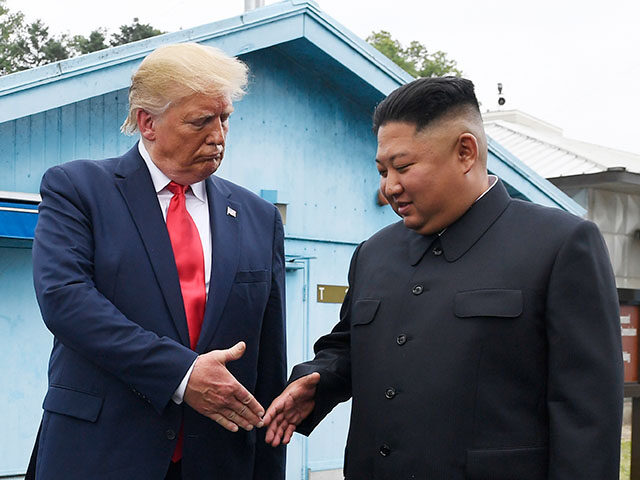Fact Check: Kamala Harris Falsely Claims Trump Wrote ‘Love Letters’ to Kim Jong-un
 AP Photo/Susan Walsh
AP Photo/Susan Walsh
CLAIM: Kamala Harris claimed Donald Trump exchanged “love letters” with North Korean dictator Kim Jong-un.
VERDICT: FALSE. Harris obviously meant this insult as hyperbole, not a serious accusation that Donald Trump and Kim Jong-un were engaged in a long-distance same-sex romance.
With that understanding, her insinuation that Trump’s letters to Kim were far outside the norm of high-level diplomatic relations is simply not true, nor was her insinuation that Kim manipulated Trump or played him for a fool. Foreign policy scholars have rejected the notion that the correspondence was frivolous and unimportant, as Harris’s dismissal suggested.
Trump and Kim did exchange friendly correspondence, including a personal letter Trump sent to Kim in March 2020. In the letter, Trump offered Kim an opportunity to develop better bilateral relations with the United States. The North Korean government expressed its appreciation for the offer.
Trump and Kim ultimately exchanged 27 messages, a volume of correspondence Trump once referred to as “beautiful letters.”
Harris is not the first to riff on this characterization by referring to them as “love letters.” For instance, Middlebury Institute of International Studies scholar Robert L. Carlin called them “love letters” in an August 2021 review for Foreign Policy.
Carlin noted the exchange was not all that different from previous attempts by U.S. and foreign leaders to develop a personal relationship that might shape international policy — a combination of “tactical feints, unctuous flattery, and psychological ploys that have marked exchanges of leaders of all stripes and stations throughout history.”
After reading all of the Trump-Kim correspondence, Carlin concluded it was wrong to cynically dismiss them as “love letters.” Instead, he found the exchange between the two leaders was substantive, and Trump did a good job of responding to signals sent by Kim.
Like many such exchanges throughout history, this one didn’t really pan out, as Trump was ultimately unable to negotiate denuclearization or sustained engagement with North Korea.
There is evidence that Kim still thinks well of Trump on a personal level, and while that does not guarantee diplomatic success in the future, it could be a significant asset. It is certainly clear that Kim and his regime do not respond well to leaders who belittle or threaten him. It is remarkable that a relationship that Trump began by dismissing Kim as “Little Rocket Man” ended on a much higher note.
North Korean state media explicitly dismissed the possibility that “personal feelings” between Kim and Trump would translate to improved bilateral ties, should Trump win the presidency, in a column published in July that stated plainly of the U.S. presidential election, “we do not care about this.” The article also noted that Trump did not implement any policies that benefited the North Korean regime.
After the assassination attempt on Trump in July, Kim sent a personal message of sympathy and “warm greetings” to Trump and his family.
“He sincerely hoped that they would be recovered as soon as possible. He hoped they will surely overcome it,” North Korean state media said of Kim’s letter.
Source link

